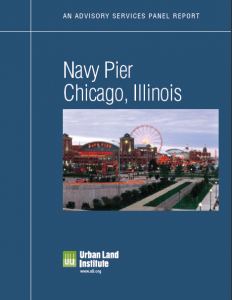Top Story
 Date: February 21 – 26, 2010; August 29 – 1, 2010
Date: February 21 – 26, 2010; August 29 – 1, 2010
Location: Chicago, Illinois
Sponsors: city of Chicago and the Metropolitan Pier and Exposition Authority (MPEA)
Chair: Daniel C. Van Epp
Subject Area: Economic Growth and Development, Infrastructure and Transportation
The Panel’s Assignment
At the request of the Metropolitan Pier and Exposition Authority (MPEA), the ULI Advisory Services Program convened a panel in February and August 2010 to assist in the creation of a vision for Navy Pier. Originally studied by ULI in 1989 and subsequently redeveloped using many of ULI’s early recommendations, Navy Pier has operated successfully for two decades with only minor changes along the way.
At the time the February panel was held, the leadership of the MPEA and its very constitution as the governing body of Navy Pier were in flux. In spring 2010, the MPEA board was disbanded, and a trustee was appointed by the state legislature to manage the affairs of the Authority and craft a recommendation to the state legislature, the governor of Illinois, and the mayor of Chicago for long-term governance of Navy Pier.
In May 2010, the trustee contacted ULI and requested that the Advisory Services Program reconvene a panel consisting of some of the original panel members. Its task would be to formulate a set of near-term recommendations based on its earlier findings and consistent with the vision and guiding principles it had developed, but with a focus on near-term implementation, recognition of the current economic conditions, and an understanding of the limited availability of public and private capital. The panel assumed that some portion of the October 2010 bond issuance by the MPEA could be used first to partially catch up on deferred maintenance and second for capital improvements. In addition, some private funding was assumed to be available for certain redevelopment options.
The August panel reviewed the earlier recommendations and concluded that, first, the MPEA should answer a call to action regarding the confirmation of its purpose and mission, focus on governance and leadership at the pier, and then immediately craft a long-term strategic plan that would guide Navy Pier through its next decade. Such a plan is a necessary step in beginning a redevelopment program that is consistent with the long-term vision for Navy Pier.
Next, the panel sought to prioritize how the MPEA might spend capital dollars, as they become available, on a series of improvement projects. Finally, the panel offered its thoughts on several other issues that are less critical to the near-term action plan but still warrant consideration. The first part of this report outlines the near-term recommendations. It is followed by the vision for Navy Pier and the context within which the recommendations were made.